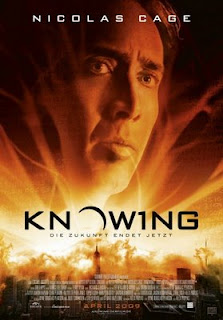 This movie falls prey to the typical difficulties when dealing with end of world scenarios: Is salvation to be found spiritually or through science? Director Alex Proyas designs beautiful scenes, but he's not a natural storyteller in the big picture sense, so this film is muddled and cannot decide what it wants to be.
This movie falls prey to the typical difficulties when dealing with end of world scenarios: Is salvation to be found spiritually or through science? Director Alex Proyas designs beautiful scenes, but he's not a natural storyteller in the big picture sense, so this film is muddled and cannot decide what it wants to be.Nicolas Cage is a scientist at MIT and is, of course, an athiest because his wife died in a hotel fire. Why tragedy must always result in atheism is childish hogwash, but that's Hollywood for ya. You'd think they never heard of the "life is a test" argument; that we're judged on how we meet our challenges--but that's too deep for those who never enter a church except for a funeral.
So when Cage is faced with the fact that a prescient young girl recorded the date and location of hundreds of fatal incidents fifty years ago, he naturally looks for a natural explanation. And he finally finds it, when everything ends due to a solar flare that threatens to burn away the earth's protective ozone layer, thus killing everyone.
At this point, the film has a chance to become interesting. But the filmmakers are conflicted; they seem to know that audiences would prefer a spiritual answer, but their all-encompassing athiesm requires either a deux ex alien or a tragic total destruction scenario. (Remember, they are enlightened and educated, not irrational snake-handlers like we moviegoers.)
So the ending, while minutely hopeful, is not spiritual, and like the also almost, almost great Contact, the filmmakers hedge their bets and try to have the best of both worlds. Yeah, Cage and almost everyone else dies, but some few survive, "called" by protective aliens to leave earth and populate a new planet of endless golden fields and immense, glowing trees. You know, a new Adam and Eve and all that hooey that rational people just cannot stomach. (Why aliens should care about us is never explained.)
So, instead of a crowd pleaser that recognizes that God is in control and would deal with global natural disasters either by avoiding/minimizing them or transporting select people elsewhere and gathering up all those who die into His loving bosom, we have Cage and everyone else incinerated at the end of the film. But, hey, at least they resolved their differences and had a big group hug, so we don't feel so bad.
And the execs at the studio wondered why this film didn't make more money. Hmm. Now, who's smarter: the athiests with the camera or the audience that stayed away because who wants to pay good money for hopelessness?
No comments:
Post a Comment